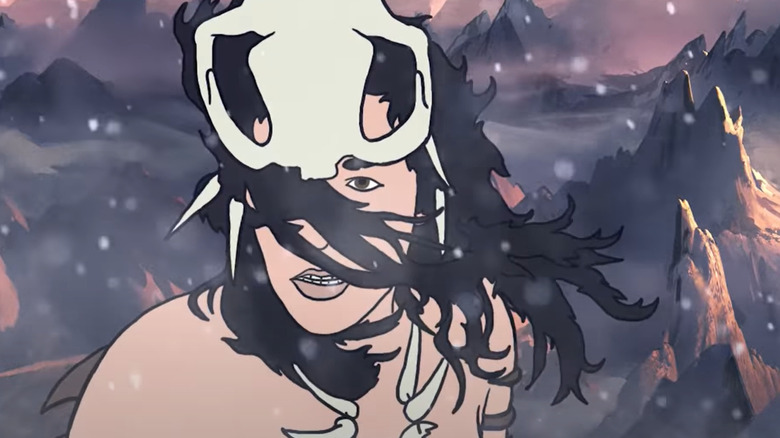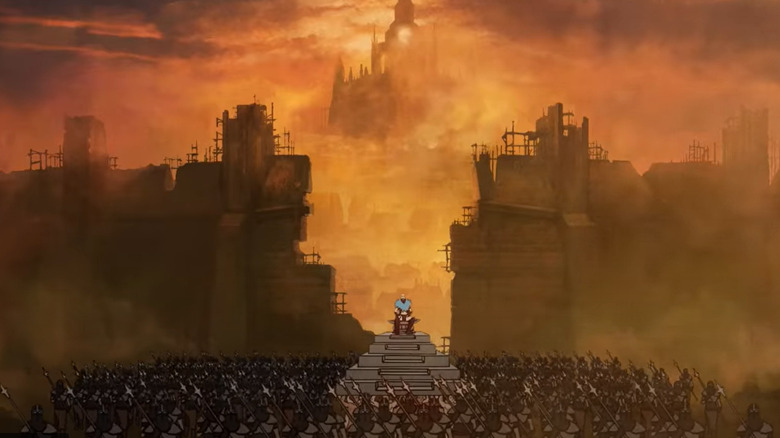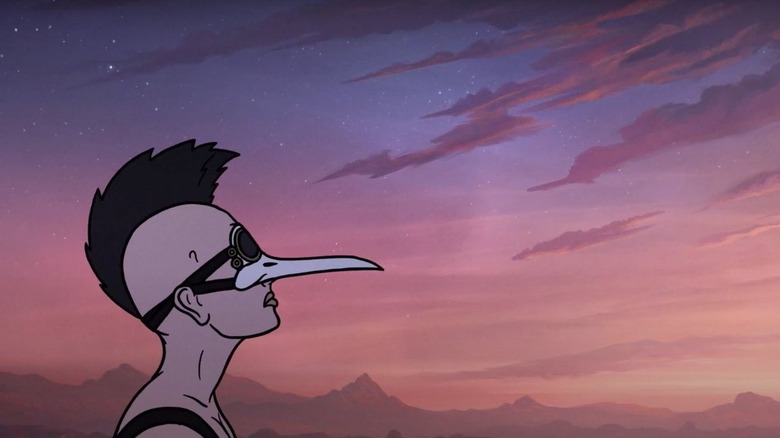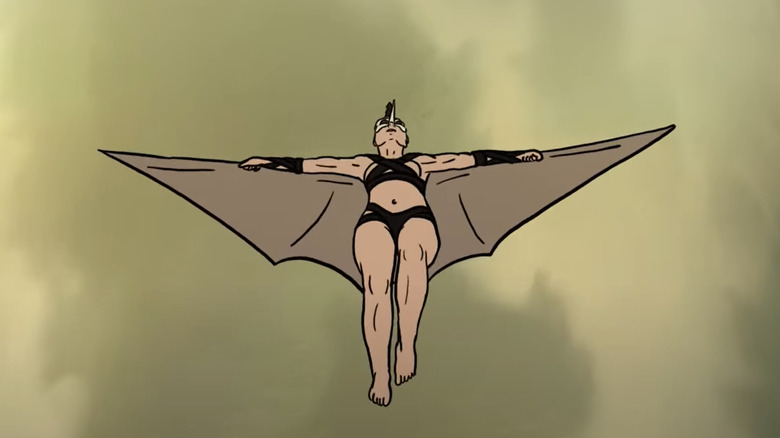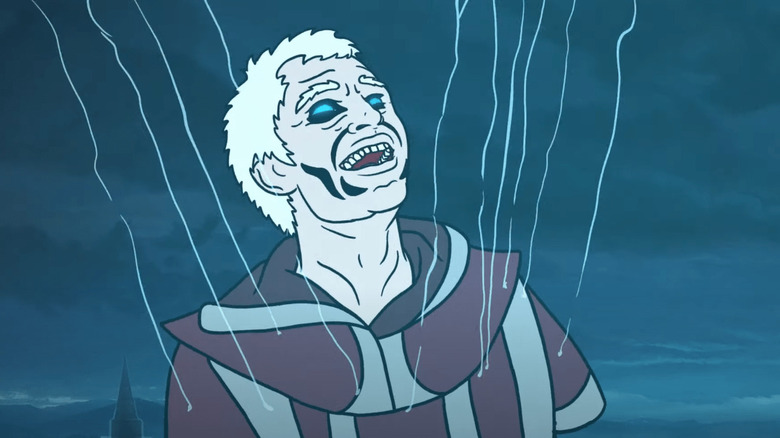The Spine Of Night Creators Spill On Their Gorgeous, Gory Rotoscoped Epic [Interview]
There are a handful of rotoscoped fantasy classics that every nerd knew in the 1970s and '80s. Whether it was the rollicking rock and roll fantasy of "Heavy Metal" or the extended epics of the Rankin and Bass "Hobbit" or "Lord of the Rings" movies, the unique animation style implanted itself in our collective subconscious. Now there's a new rotoscoped fantasy epic destined to join the ranks, "The Spine of Night." "The Spine of Night" is a sprawling fantasy epic that ties together multiple stories using the frame narrative of two ancient beings sharing memories. One of those beings is the swamp witch Tzod, voiced by "Xena: Warrior Princess" herself, Lucy Lawless. The other is an ancient keeper voiced by Richard E. Grant. Together, they weave together the intertwining tales that make up the violent, gorgeous "The Spine of Night."
"The Spine of Night" comes to us from writer and director Philip Gelatt, best known for directing 2018's "They Remain," and writer, director, and animator Morgan Galen King, who created a rotoscoped fantasy short titled "Exordium" in 2013. "The Spine of Night" has been a labor of love for them that they're excited to unleash upon the world. After chatting with Lawless about the similarities between herself and the immortal Tzod, I had the opportunity for a nice phone sit-down with Gelatt and King to dig into all of the gritty, gory details of "The Spine of Night."
This interview has been lightly edited for clarity.
"I think from the very inception, we never really imagined it being any other aesthetic."
What inspired you to do sort of the old fashioned rotoscoping for "Spine of Night"? I know you did it on the short, but it's just, it's got to be time-consuming.
Philip Gelatt: Yes. Yes. It's incredibly time-consuming. I think it's one of those styles in the era of computer-assisted motion capture. People don't really appreciate how extremely time-consuming it is. As to why we did it that way. I mean, oh, madness or hubris, but I think we both just, we grew up in the era where rotoscope fantasy was particularly, with like a slightly adult angle on it, was really common. It was sort of like the defining thing I watched when I was young. With Heavy Metal and Fire and Ice and there's even some like He-Man. It was that year that like, I don't know, Take On Me, that A-ha video was on. So, it was like rotoscoping was everywhere in it's really formative years for creating a fantasy world.
I think from the very inception, we never really imagined it being any other aesthetic. Yeah. It was always going to be the hard way, for better or worse, I guess is another way of putting it. Just because the two, that brand of fantasy and that style animation were so wet in our mind. It was sort of, it just seemed obvious. Yeah.
I feel like this kind of goes into that. Can you tell me a bit more about the decision to make the film so ultra violent? There's just guts and gore everywhere. It's a little more than Rankin and Bass or even Ralph Bakshi I'd say.
Morgan Galen King: Yeah, yeah. That's fair. I guess I was like, in my mind the gore, is sort of like from the last segment of Heavy Metal. The Taarna segment, the Mobious style one, which is, I always found the gore in that to be gruesome but appropriate. Probably it also is filtered through decades of watching horror movies. I'm a big fan of like, "Dead Alive" or "Brain Dead" and "The Evil Dead" and all of those is a similarly formative experience so, I wanted to you to view the film with that sort of thing. But, I also think that there's like a, like it also serves a narrative purpose or a cinematic purpose in that we wanted to talk about the cost of war and violence and the fragility of the human body in the context of like a greater cosmic stage. So, I think making sure you that the violence didn't ever feel sanitized or that the injuries were not grievous. I think it would've worked against what we were trying to do with the subtext.
Gelatt: I'm imagining what the Rankin and Bass, how it would've been like, had it been as violent as our movie. It would've been a much, much different experience. The Rankin and Bass Gollum is creepier than anything. That's true. Traumatizing as a child. Yeah, absolutely.
"All these powerful forces that could do something about it and simply refuse to."
There are big themes of environmentalism and protecting the planet in The Spine of Night. Can you tell me a little bit more about what drew you to explore that?
Gelatt: Oh, I sort of feel like you can't be an aware human being at this moment in time and not have some sense, even when, I mean, we wrote it in 2014 but, not have a sense of impending doom about the imminent climate disaster. All these powerful forces that could do something about it and simply refuse to. I think there's, a lot of the films are talking about like how power is distributed and how power is collected. I think you see it's in the environmental angle of the film and how that is just as disposable to these big powers and human lives. And also just, all sorts of other unjust hierarchies that exist in this world. Like it's pretty, it's still pretty aggressively patriarchal and I don't know, it's a lot of slavery and misery.
But, the environmental angle seemed fundamental to them. Like, to talk about the emotional arc of the planet, as much as the individual to our passenger. Yeah. I mean, it feels like it sometimes the theme of our lifetimes. I think anybody who's alive right now. So it feels like it is you, you would almost anticipate some kind of mind to it, whenever you're writing something probably but, in particular with something like this where the nature of the story we have written, spans ages in the course of this fantasy world that we've created. So, it just felt, as Morgan said, fundamental to it both in a narrative sense and in a cinematic sense.
"We knew we wanted to approach actors who were fans of the genre."
And tell me a little bit more about how you came up with the varied time traveling characters and how you sort of figured out which voices you wanted to go with them.
Gelatt: Interesting.
King: Yeah. I mean, I think from the very inception, we sort of had two twin ideas of like how we wanted to structure the film. One was like, again, to look back to "Heavy Metal" from maybe one. It's a funny anthology of shorts that they sort of shoe horned in this connecting idea of the evil green orb, the Loc-Nar that sort of like pops up in all the story. Often in a way that doesn't really have anything to do with the story. So we wanted to approach an anthology with like a connective idea that would bring you through all of them so they were all of a whole.
Then also, I'm just a huge fan of Walter M. Miller Jr.'s "A Canticle for Leibowitz", '70s sci-fi book, which served as a similar structure where you start with just like hints of the path. Then between each act of the book, you jump hundreds of years into the future. You see the ripple effect of that one moment you spent time in, and then you've got a whole new cap of character. It's a whole new window into a different place and time and so, we sort of, marrying those two ideas.
I think it was really creatively interesting, to me, to tell the story in a way that I think you wouldn't normally see in film. As far as picking the perspective characters. I don't know Phil, what I don't really remember. I mean, I sort of think of it in terms of the actual, in terms of writing the characters. I think we were, well, I don't know if we ever discussed it out loud, but I think we're both just such, we're so steeped in the fantasy genre and genre fiction in general, that you can sort of look at the characters that we created as our versions of certain archetypes, right?
Like you have like the Mongrel, the Joe Manganiello character, who's sort of a bend on Conan the Barbarian. And then you have Phae-Agura who is the like librarian character who, to my mind has always been like a fantasy Indiana Jones, right? Like has that Indiana Jones DNA to her. And then of course we have an evil wizard and we have a necromancer and we have sort of the bird, who are vaguely superhero-ish. So, I think that really, conscious or subconscious attempt to sort of leave our mark on certain archetypes of the genre. In terms you asked about capturing the voices too, right? That was the second part of the question.
Yes.
So for that part of it, it wasn't too hard. In that we knew we wanted to approach actors who were fans of the genre and who would get what we were doing. So Joe Manganiello, being a very obvious case of a guy who loves D&D, loves adult fantasy artwork, and just immediately got what we were doing. I think he said that he watched the first five minutes and said was clearly made by crazy people and he wanted to work with crazy people. And I thought that was the height of a compliment as far as I'm concerned.
He was like, Patton [Oswalt] is a similar thing. Like, he loves nerdy stuff. Lucy obviously comes from, she's sort of like genre royalty, she comes from "Xena" and from "Battlestar Galactica" and just as a personality is so forceful and outspoken, charismatic and talented. I'll just keep heaping praise on her because, she's just, she's just great. Then, for Richard E. Grant who doesn't, he's done some genre stuff, but not really like this. I guess "Star Wars" sort of, and "Warlock" but, we just wanted somebody who could bring both gravitas and pathos to that character. And he really was, I mean, elevated it far beyond what I thought was possible. So yeah, that was sort of the motivating philosophy of the casting. Yeah.
"I just want people to know it's out there."
Awesome. Are there any other stories, either your own or that already exist in fiction, that you want to take on using rotoscope?
King: Well, I don't think we'd want to spend seven years on a single project like this, again. We did it through a real brute force method, just hand drawn and impossible. So, I think we need a much bigger team to do it. So it didn't take quite so long and be quite so grueling. We definitely, over those years, like it's hard to argue, [it] may be impossible to spend that much time with these characters, in this world and not have you mind filled with other places they could go and other stories you could tell. We have, we just have notes and outlines for possible feature things. If the stars align for it and people really gravitated to a love of this older approach as much as we did or like the aesthetic.
So, I'd love to do more if we had the chance. We'll see.
Gelatt: Yeah. I mean, tons of genre of fiction that I love and that it would be fun to adapt, but I have to say like more and more, especially with this movie, it's so exciting to make your own story. And it's so rare to have something that's not based on a previous, and pardon me using this term, a previous idea, where instead, just like to make your own thing. So, I don't know. I would love to do more, but I think probably I would look for influence from other outside texts and try to envelope them into our own in a way. It's similar to how I call Mongrel our Conan. Sort of similar, call it an anxiety of influence, on anything we did going forward would be sort of where my mind is right now. Yeah.
All right. Is there anything else that you want /Film readers to know about Spine of Night?
Gelatt: Oh, I just think it's just a, you know, is a real earnest labor of love. And I get that it's going to be, it's like a cult within a cult within a cult, but I think it is going to really love it. But, I hope everybody gives it a chance to be it's own weird thing, because independent animated features are just really rare and you won't see a lot of them and if you don't support them, you won't get to see more. So, I hope the rarity of it and the unusual ness of it, is at least somewhat compelling and people can get on board with that. I hope.
Yeah. I would say if you ever wonder to yourself, do I like ultra violent, that pretty naked, hand-drawn, dark fantasy animation? Then this is your chance to find out this is your litmus test. Check the movie out and you might think, oh, wow, that was not for me. But, you might also think, oh my God, I love this. it's incredible. So I just want people to know it's out there.
"The Spine of Night" is playing in select theaters, and is available to rent On Demand and digital. It should debut on the Shudder streaming app some time within the next year.
